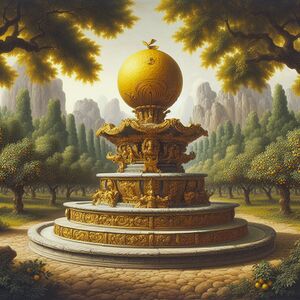Imperial Lemon Grove: Difference between revisions
mNo edit summary |
mNo edit summary Tag: 2017 source edit |
||
| (4 intermediate revisions by the same user not shown) | |||
| Line 1: | Line 1: | ||
[[File: | [[File:Grove Fountain.jpg|thumb|An artistic rendition of the southern fountain in the Imperial Lemon Grove.]] | ||
The '''Imperial Lemon Grove''' was a large grove of lemon trees located | The '''Imperial Lemon Grove''' was a large grove of lemon trees located within the [[Palace of Columns]] near the summer imperial capital of [[Daguo]], [[Daxia]]. The first trees were uprooted from [[Rusana]] and planted in the grove by Emperor Chengzi in the year 1256 to provide lemons for his predilection for drinking a glass of lemonade every day. The incorporation of parts of [[Rusana]] later in history and the expansion of trade meant the grove was more decorative and recreational in nature later on. During Chengzi's reign the grove grew to cover an area of sixty hectares and included walkways, artificial ponds housing exotic fish such as giant carp, bridges, a pagoda and several carved gazebos where palace visitors and officials could meet for lunch. | ||
[[Category: | |||
Chengzi's successor ordained the creation of an entire department to supervise the expanding grove and the infrastructure related to it. A specialist gardener corps was formed and a hereditary High Gardener was appointed to oversee their work tending to the lemon trees. A large marble fountain shaped like a giant carp was built in 1282, with lemonade flowing out of its mouth at all times. The Imperial Lemon Presser's Guild was chartered to ensure the fountain was perfectly maintained and the flow of lemonade was never interrupted. Starting in the early 16th century the lemons of the grove were used by the Imperial Stool Groom to fashion scented oils, perfumes and lemon scented soaps for use by the members of the Imperial family and as gifts to dignataries. | |||
The grove was also the scene of tumultous events; in 1345 Emperor Huichen was murdered there as a result of a conspiracy by several of his ministers. The penultimate Zhong ruler, Huichen's assassination left the imperial throne vacant and led to a protracted civil war that raged until 1350. Mentions of the grove stop after the year 1520 when it is thought to have burned down alongside the western wing of the Palace of Columns. | |||
[[Category:Daxia]] | |||
[[Category:IXWB]] | [[Category:IXWB]] | ||
Latest revision as of 23:50, 8 February 2024

The Imperial Lemon Grove was a large grove of lemon trees located within the Palace of Columns near the summer imperial capital of Daguo, Daxia. The first trees were uprooted from Rusana and planted in the grove by Emperor Chengzi in the year 1256 to provide lemons for his predilection for drinking a glass of lemonade every day. The incorporation of parts of Rusana later in history and the expansion of trade meant the grove was more decorative and recreational in nature later on. During Chengzi's reign the grove grew to cover an area of sixty hectares and included walkways, artificial ponds housing exotic fish such as giant carp, bridges, a pagoda and several carved gazebos where palace visitors and officials could meet for lunch.
Chengzi's successor ordained the creation of an entire department to supervise the expanding grove and the infrastructure related to it. A specialist gardener corps was formed and a hereditary High Gardener was appointed to oversee their work tending to the lemon trees. A large marble fountain shaped like a giant carp was built in 1282, with lemonade flowing out of its mouth at all times. The Imperial Lemon Presser's Guild was chartered to ensure the fountain was perfectly maintained and the flow of lemonade was never interrupted. Starting in the early 16th century the lemons of the grove were used by the Imperial Stool Groom to fashion scented oils, perfumes and lemon scented soaps for use by the members of the Imperial family and as gifts to dignataries.
The grove was also the scene of tumultous events; in 1345 Emperor Huichen was murdered there as a result of a conspiracy by several of his ministers. The penultimate Zhong ruler, Huichen's assassination left the imperial throne vacant and led to a protracted civil war that raged until 1350. Mentions of the grove stop after the year 1520 when it is thought to have burned down alongside the western wing of the Palace of Columns.